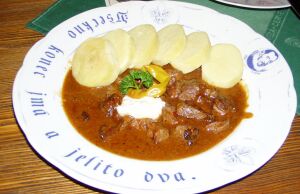I’ve been introduced to a lot of Czech food recently, courtesy of some Czech friends, and it’s been a fun (if sometimes weird) experience. It’s also given me the opportunity of visiting real local-style places. I haven’t quite decided what the criteria for distinguishing a ‘local-style’ place is yet, but if it’s in anyway intimidating then it almost certainly counts.
 The food I’ve been served reminds me a lot of the food I used to eat in England as a child: heavy, meaty, and simple. Popular foods here are dumplings (potato and bread varieties), meats and meat sauces, bread, cabbage, and cheese.
The food I’ve been served reminds me a lot of the food I used to eat in England as a child: heavy, meaty, and simple. Popular foods here are dumplings (potato and bread varieties), meats and meat sauces, bread, cabbage, and cheese.
Fried food is far too popular, and a meal may consist simply of fried mushrooms, boiled potatoes, and some tartar sauce. Tasty, but not particularly healthy.
As an unconfirmed vegetarian it can be a frustrating experience, although there are some notable exceptions (the excellent Radost FX being one).
I’ve had some pretty unexpected surprises. For some reason, eating spinach with cream is very popular here. Now I love spinach on its own, but with cream? Using my basic understanding of Czech I ordered what I thought was a spinach pizza. The menu mentioned spinach (spenat) and cream (smetana), but I figured it was spinach, with some sort of sour cream in a small side dish. Alas not, it simply meant spinach and cream. It would actually have been alright if it hadn’t been for the raw egg placed gently on top. I missed that word entirely!
My Czech again tripped me up when I ordered a potato and chicken roll, only to discover that the chicken was rolled over liver, and the potatoes were the vegetable side dish.
 One dish I haven’t yet tried is fried cheese, or smazene syr*. I don’t like passing judgement on something untasted, but instincts suggest that taking a piece of cheese (which, let’s admit, is mostly fat) and then frying it is not the most sensible thing. And yet the Czechs swear by it.
One dish I haven’t yet tried is fried cheese, or smazene syr*. I don’t like passing judgement on something untasted, but instincts suggest that taking a piece of cheese (which, let’s admit, is mostly fat) and then frying it is not the most sensible thing. And yet the Czechs swear by it.
Today included a particularly interesting excursion to a ‘hard-core’ locals pub. The place was very well used, everything had a sticky battered feel, and the clientèle were all dusty construction workers. The food was… uncomplicated.
What is kind of sad is that this traditional food has almost died away in England. When I was young there was nothing unusual in eating stew and dumplings, roast potatoes and chicken, or some other traditional dish. Nowadays there’s a myriad of foods from around the globe, pre-prepared instant meals, frozen meals, and many other conveniences. Don’t get me wrong, I like eating all these different foods, and I’d do (almost) anything for a good curry, but something seems to have been lost. The food revolution that dragged people from the awful post-war meat and boiled veg to the current multi-cultural cuisine has resulted in a lot of English people no longer knowing what English food is. Everything is one big American-Italian-Indian-Chinese melting pot.
The Czechs really enjoy their food and are proud of it, but I can’t help wonder if they’ll suffer the same globalisation of food that has killed traditional food in England.
Totally agree. What happened to stew and dumplings? Loved those dumplings, and my Grandma’s potato pie, scallops … her wonderful fresh apple pie baked on its big enamel plate…mmm! But she’s long dead now and it seems freshly cooked English grub died out with her and her generation. I’ve lived in Malaysia for the last 15 years so I wouldn’t get to eat it much anyway, but whenever I go back I get the impression most people eat a regular diet of various “instant” foods. I liked the old system; on Mondays it’s dumplings, on Tuesdays it’s scallops, on Wednesdays it’s … 😛
Why hello!
I just want to know if English people eat traditional food on ordinary days or just for the special occasions?
And if not; why has Britain lost the traditional food culture?
Does it have something to do with tourists?
Thank you!
I wouldn’t say it has anything to do with tourists, but more an effect of globalisation and modern life. People now have access to all different foods and ingredients, and I’m sure that most people, given the choice of stew and potatoes or a pizza, would pick the pizza.
Also, people generally have less time to spend preparing food. I know I don’t have the time to take an hour cooking a stew, especially as I can whip up some pasta in 15 minutes.
Maybe the whole thing will come full-circle, and the next generation will return to traditional food as it’s more ‘new’.
So yes, I’d say that traditional English food probably has become a special occasion kind of thing. That’s what was interesting about the Czech Republic – it hasn’t lost it’s traditions … yet. Now that it’s part of Europe I wonder how long this will be true.
Losing our traditional eating habits in England may have something to do with many more wives and mums now working, and working longer hours, too.
Rushing home after a day’s work leaves little appetite for time consuming old fashioned cooking. Even if you have a nanny who may have the time to prepare the meal, it’s likely that she’ll know only how to dish up something from her home country.
The other influence has been the media. The trend for dieting, in other words, eat less/eat healthily (read: salads), and adverts like, and I paraphrase “our chilled meals leave you time to live your life”, have all changed our culture.
In other words, we no longer have the same values that our parents had. Culturally, we are different, ever more “American” (horror of horrors) as American culture dominates the globe through film and television.
I have no idea if you’re still in Czech Republik or not. I lived in Prague in 92-94 and worked at Radost in its early days. It was one of two places then that served vegetarian food… the other was the Krishna house!
Anyways, if you are in Prague and haven’t tried smazeny syr yet, I highly recommend going to the clubs and then hitting the Non-Stop at Masarykovo Nadrazi at two or three in the morning. It’s… an experience. Smazeny syr is best eaten after much alcohol…
Things haven’t changed much, and it’s still one of the two places that serve vegetarian food! Alas I am in China now so the deep-fried heart-clot will have to wait off for a while (said with tongue-in-cheek), but I’m going to Slovakia at the end of the year so that may be as good a time as any to finally try it (I assume the Slovaks have a similar cuisine)
Interesting that you worked at Radost, I didn’t know it went back that far. It certainly must have seemed ahead of its time in 92
plz could anybody tell me of any warehouse or cash and carry where they sell czech food.we want to open a czech shop to sell food.thxs
I don’t think the Czechs (or Brits) should be crying about the loss of their cuisine.
There are PLENTY of cultural contributions that both nations can offer the world. Food doesn’t necessarily have to be one of them.
I’ve been to the Czech Republic many times and have always been disgusted with the food there (and I’m a confirmed vegetarian). Most of their food is the result of centuries-old poverty and deprivation. Now that the country is relatively prosperous and has access to far healthier items from not-too-far away, should they really be frying their cheese?
If they want to live to 68 years old, then sure. If they want to live until their 80s like (far more globalized) Japanese, Hong Kongese and Swedes, then they might want to develop a taste for things that are naturally green. And they might want to learn cooking techniques beyond frying everything in oil.
I will never understand why people are so fiercely protective of every single cultural tradition. Some of them are not worth keeping. (Genital mutilation is another that might go the way of history, in my opinion).
Jason,
You must have experienced a side to Czech food that I never did, and the post is not about being fiercely protective of cultural traditions. All foods are based upon local culture and conditions, and if Czech food comes from poverty and deprivation then it is no different than most. I ate a lot of good Czech food while in Prague, and fried cheese was but a small part of the cuisine. I am ‘crying’ about the loss of traditional simple foods, pushed aside in the wake of generic processed food. The Czechs eat plenty of vegetables, unlike the current Brits who have generally adopted an American-style diet.
I am curious as to why you’d say the Japanese are far more globalized? It’s not an attribute that instantly comes to mind when I think of Japan (nor Hong Kong or Sweden, for that matter).
I stumbled upon this page while researching some Czech recipes. Did you ever realize it is so negative?
Why do you say that Carol?
Hi John,
I have to post a comment to your article event though it is three years old. I know Czech food is very filling and not probably the healthiest food but I disagree with you that it tastes bad. Czechs are one of the nations that try to use every resource to make their food but they always make it very tasteful. I am actually trying to introduce some original Czech recipes on my site. Please, give it another try and don’t worry, Czech food won’t disappear from the planet or get overshadowed by American-Italian-Indian-Chinese cuisines. 🙂
http://czechfolks.com
I never said it tasted bad! In fact I said the opposite – I enjoyed Czech food a lot. Some other people may have left comments here giving their personal preference, but that’s nothing to do with mine.